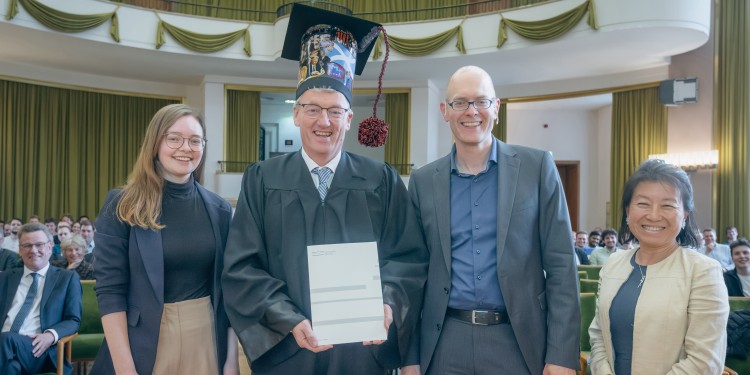
Nobel Prize laureate David MacMillan receives honorary doctorate
He is one of the most successful researchers of our time in the field of catalysis and molecular chemistry: David MacMillan, a professor at Princeton University (USA), was awarded the Nobel Prize in 2021 together with his colleague Benjamin List for his work on asymmetric organocatalysis. The 56-year-old Scottish-born scientist is also a pioneer of photocatalysis with visible light. In recognition of his outstanding research in this field, the Faculty of Chemistry and Pharmacy at the University of Münster awarded him an honorary doctorate on 11 June.
“Through this research and his outstanding publications, he has inspired numerous scientists worldwide and made further breakthroughs possible,” said Dean Prof Frank Glorius in his laudatory speech. Photocatalysis with visible light is probably the most significant advance in reaction methods of the past 20 years. “David MacMillan is one of the leading pioneers and, in my opinion, has even surpassed his Nobel Prize-winning development of iminium organocatalysis.”
David MacMillan emphasised what a great honour it was to receive the award from the Faculty of Chemistry and Pharmacy. The reason being that “in organic catalysis, some of the worldwide superstars are working at the University of Münster.”
Numerous research groups at the faculty are working on the use of visible light in photocatalysis to improve the environmental compatibility of processes, for example, or to produce new products and control reactions with light. With the honorary doctorate, the Faculty of Chemistry and Pharmacy expressed its special appreciation of David MacMillan and would like to strengthen the relationship between the University of Münster and the Department of Chemistry at Princeton University.
Catalysis is used to initiate, accelerate or control chemical reactions. Through photocatalysis, i.e. the use of light to stimulate chemical reactions, researchers aim to achieve milder, more environmentally friendly reaction conditions. In contrast to high-energy UV light, visible light produces notably fewer undesirable secondary reactions.
